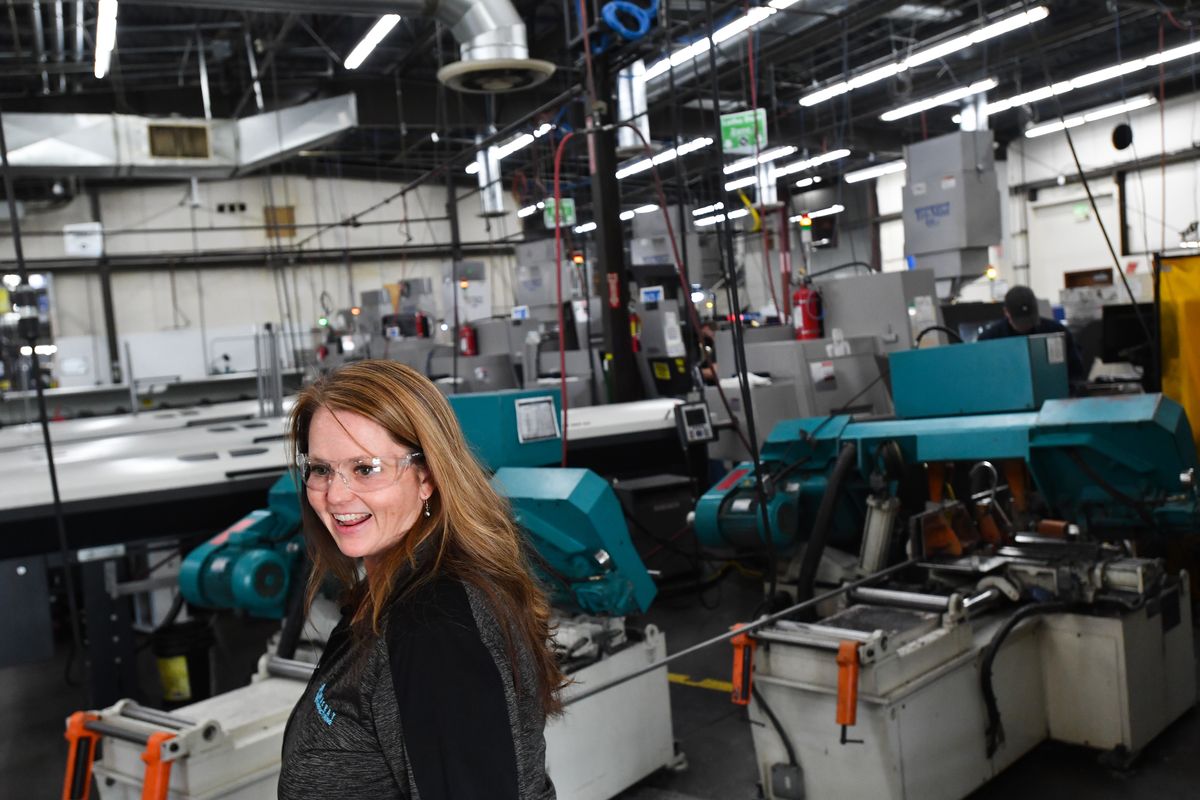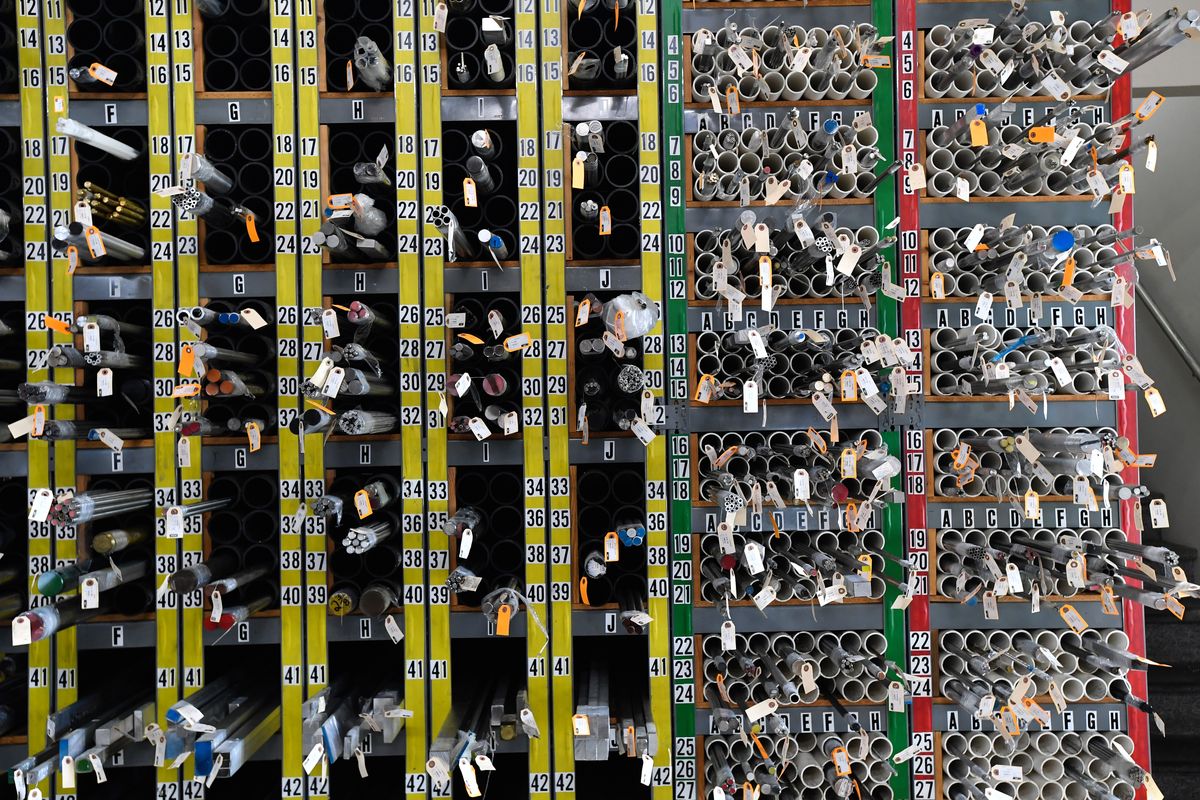AWB bus tour highlights Spokane’s variety of manufacturing companies

The Washington Association of Business trucked into Spokane for a bus tour Thursday of area manufacturers who talked about the lack of, need for and importance of training and retaining qualified employees.
The labor shortage means employers are desperate to find workers, and that sometimes means looking beyond the type of college degree or the lack of college degree, and finding flexibility in working hours and time off to keep employees once they find them.
Kris Johnson, AWB president and CEO, said the focus of this year’s tour is workforce. He noted the Spokane area has about 16,000 manufacturing jobs, giving it the highest percentage of manufacturing careers per capita in the state of Washington.
The tour started with a stop at Community Colleges of Spokane to look at programs designed to train employees to work for some of the many Spokane employers. Business leaders also have worked with other local colleges, including Eastern Washington University.
“There is a great career path from those institutions into the manufacturing sector. It is a sector that doesn’t get a lot of attention but has a huge impact in the region,” said Johnson, who got his start in Spokane. “They are great careers that have really good-paying jobs.”
The focus is to let young people know that they can get training at a local school, a job and never leave the Lilac City. “That’s a piece we are highlighting,” he said.
The tour then stopped at family-owned MacKay Manufacturing in Spokane Valley. It makes precision parts for nuclear facilities, medical devices, defense contractors and space exploration, company Vice President Katie MacKay said.
The company has grown from $900,000 in sales in the late 1980s to $32 million last year. And, the company does not employ a salesperson, she said.
“As our customers have grown, we have grown,” MacKay said.
The company employs about 170 highly trained employees who work on equipment that must be made to exacting standards. One team of employees does nothing but check the work of others.

For example, General Manager Bruce Szember said the tolerances for most parts must come in less than one-twentieth the width of a human hair.
“That’s what we ask our people to do,” Szember said. “We have an approval rate of 99.6%” on the parts manufactured in the facility at 10011 E. Montgomery Drive. “We build the difficult stuff that nobody likes to make for the high-end industries.”
Every morning, employees gather around an electronic dash board that displays the company’s revenue, its goals, and breaks down the daily jobs of all the departments.
“We are open to our employees. We want them to be successful,” he said. “One of our biggest challenges is workflow in an extremely haphazard industry. It’s chaos. We’ve gotten very good at managing the chaos.”
In the afternoon, the tour stopped at Jubilant HollisterStier, which announced a partnership in March with biotechnology company Novavax to provide manufacturing services for the production of a COVID-19 vaccine candidate.
Jubilant also signed an agreement with Indianapolis-based pharmaceutical company Eli Lilly to manufacture bamlanivimab, a COVID-19 therapeutic.
Kirk Wood-Gaines, the senior director for human resources at Jubilant HollisterStier, said he’s watched the company grow from about 400 to 850 employees.
“We’re the biggest employer in Spokane that no one has heard of,” Wood-Gaines said.
The company runs 24 hours, seven days a week and the stress of normal production has been complicated by the life-saving nature of its current work, he said.
“The pandemic has added a whole ‘nother level to our market,” Wood-Gaines said. “We literally are involved in the manufacture of products that save people’s lives.”
The company plans to add a third manufacturing line at the cost of about $80 million that would add another 200 employees. Construction on the new line could start in six weeks.
It could soon add a fourth, Wood-Gaines said. At the same time, the 100-year-old company just recorded a fourth-generation employee at the plant.
“We have many examples of third-generation employees,” Wood-Gaines said. “In today’s world, pay has to be there. Benefits have to be there. But, flexibility in hours and time off has to be there, too.”
Responding to a question about someone applying for a job with a degree in a different field, Wood-Gaines said employers have to transition away from past thinking when they address the current labor shortage.
“We absolutely have to show they have the skills and experience needed,” he said.
He noted that new hires must undergo six months of training before they touch any products. “ We cannot afford to eliminate people because of degrees” that are in a different field, he said. “There are a ton of workarounds. It just takes a different way of thinking.”
Amit Arora, president of contract manufacturing at Jubilant HollisterStier, said the relationships that the company has made have allowed it to have a global impact.
“I’m really proud of how we delivered on these projects for these companies,” Arora said, “and to be a part of serving the world during the pandemic.”